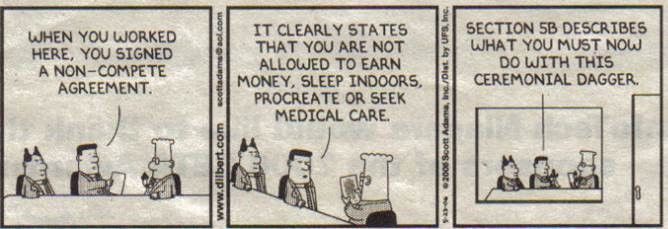H.R. Guy on Legal Agreements in Employment Contracts... and Why to Think Twice
14 March 2024
A fresh take on whether to use Non-Competes, Non-Disclosures and/or Non-Solicitation agreements

Nearly every day I get questions, requests for advice, or requests for copies of Non-Compete, Non-Disclosure and/or Non-Solicitation agreements. I am professionally NOT a fan of over-reliance on these types of documents for several reasons.
First and foremost, nothing says “Welcome to the team” on Day 1 like being handed several legal documents saying you are already looking for opportunities to sue them if/when they leave. 🤦
But let’s cover each of these documents individually to explore why I don't recommend them, and what to do instead.
TOPIC 1: Non-Compete Agreements
Simply put, they can be viable and useful when dealing with management or executive level employees… NOT line-level technicians or similar. You cannot prevent someone from earning a living in their field of knowledge/expertise. And why would you even want to try?
So what is the alternative?
For line-level employees, just don’t bother. Besides the fact that these agreements are becoming increasingly illegal (in CA it is about to become illegal to even present a non-compete that is known to be unenforceable), if you let someone go for good reasons, don’t you WANT them to become a competitor’s liability? 🤣 If the employee quits, they did it for their own reasons that everyone involved should learn from, not call out the lawyers. There is simply no path to victory for the Brand by getting into the fight – legally, or publicly when the story of “company vindictiveness” hits social media.
While managers and executives do have access to higher-level business strategy information and may legitimately be restricted from jumping to another area company as a manager/exec, there are very simple steps both the ex-employee and/or competing company can typically take to get around any restrictions, especially the lower the level of management.
Your best defense is to build and maintain a company culture that by its very nature minimizes the risk of people wanting to jump ship and sabotage your operation. Communicate and educate about how the grass is greener on YOUR side of the fence. It’s not perfect, but much more reliable than the spooky legalese of a non-compete agreement.
TOPIC 2: Non-Disclosure Agreements (NDA)
I hate to break it to you, but most of the information that companies attempt to protect with these documents is not special or private. Your marketing tactics are put in front of prospective customers every day. Your sales process is (if employees are following instructions) shown to multiple people every day. This becomes even more untenable once you factor in the contribution and influence of your chosen Best Practice Group, Coach, Mentor, and/or Guru you contracted to help grow and evolve your company.
Just like non-competes, NDA’s are pretty much not worth it for any employee ranked lower than Senior Management. If you truly have a unique process, strategy, or marketing materials, take the steps to Trademark them rather than rely on legal documents that are insanely difficult to prove violation of.
From the pure HR perspective, here is a quick reminder of the impact of NDA’s on the Day-1 Experience: “Welcome to the X team! So happy to have you join us… Now, sign here so we can sue you if you ever share the secrets of how we sell things outside of the group of people we are telling you to sell to.”
TOPIC 3: Non-Solicitation Agreements
Last, but not least, is non-solicitation.
Many employers are actually concerned about this when developing non-compete/disclosure agreements. In the legal world, being precise in your word choice matters. There are two areas of non-solicitation that warrant attention… though at the end of the day, I still don’t find formal legal documents beneficial, either as a real deterrent or for ongoing team morale.
Start by asking: who are you looking to prevent ex-employees from soliciting?
Marketing to your Active Customer List
- THIS is worthy of consideration. Your active customer list can and should be protected as proprietary company property. However, there is little to no benefit in drafting a legal document threatening to sue a new employee over the list.
- Alternative to Non-Solicitation Agreement: Include properly written policies in your employee handbook identifying customer lists as company property, and state that failure to return ANY company property is legally actionable theft. Then, if you find an ex-employee targeting your customer base, you can go after them. Just be aware that if someone markets to a neighborhood that just happens to include specific customers, there is likely no provable violation, regardless of legal document or employee handbook.
Enticing Former Co-Workers to their New Business
- I never understood the logic of this. Do you seriously think you can prevent friends from talking to each other after one quits or is fired? Do you really want to forcibly retain employees, let alone those with divided loyalties because they buy the story of their buddy on how they were mistreated (always 2 sides of the story)?
- Alternative to Non-Solicitation Agreement: I love the alternative, and clients tend to be shocked when I tell them: “Get ahead of the conversation with your team. TELL them why you let so-and-so go or their stated reason for quitting, pretty much as soon as they are out the door.” There are no confidentiality concerns 99% of the time. If you as management can accept your failings in the situation that caused the employee to leave, own that, along with what you’ll do to minimize the risk of it happening to others. At the end of the day, you need a team that trusts management decisions, and the best way to achieve this is proactive and intentional communication. Invite employees to ask questions to alleviate their concerns. If they really want to take the exited employee’s side, it is better to promote them to customer before they turn toxic and further undermine the brand.
To summarize: Most “legal” documents that are used to theoretically protect the business, such as Non-Competes, Non-Disclosures, and Non-Solicitations, are not worth the paper they are printed on. They amount to little more than paper shields that in reality serve as a wedge between employer and employee that can hinder a long and profitable relationship.
Company culture can minimize the risk of employees (or employers) from going off script or against the Brand and causing damage. Intentional communication, setting clear expectations, and meaningful accountability in real time will be WAY more beneficial than threats of lawsuit.

Written warnings can be key in managing employees, so you need to know both the art and the science of doing them correctly. These tips for what to include - and what NOT to include - in your written warnings will help you to communicate clearly to your employees, and get you set to defend yourself in a potential legal claim against you.

Reasonable Accommodations in the workplace are no joke - you can get into serious legal trouble if you don't comply with the ADA. Yet here's a case study on a company who terminated someone for an issue directly related to their disability and was not held legally liable. Check out the details of how this might apply to your business.








